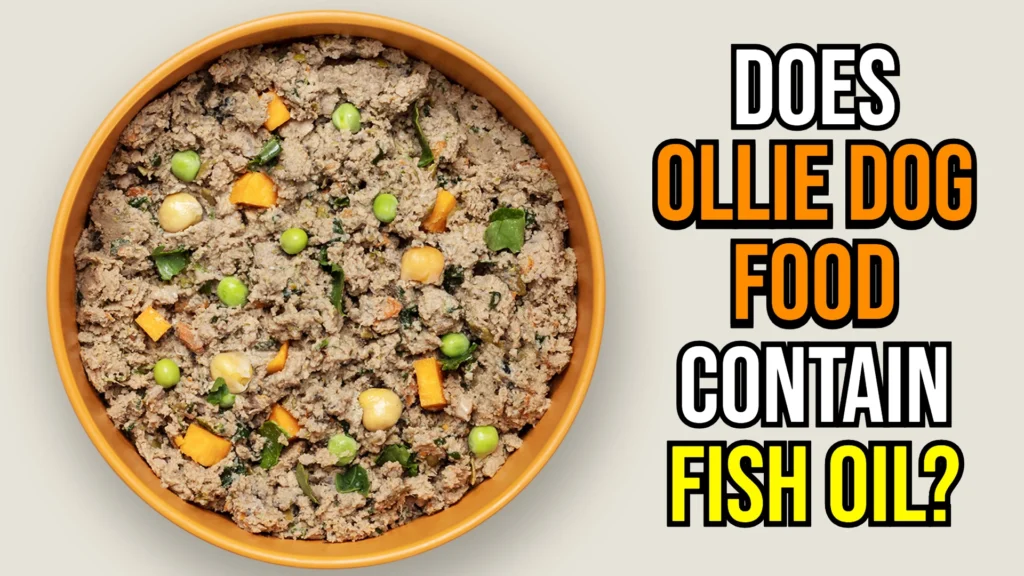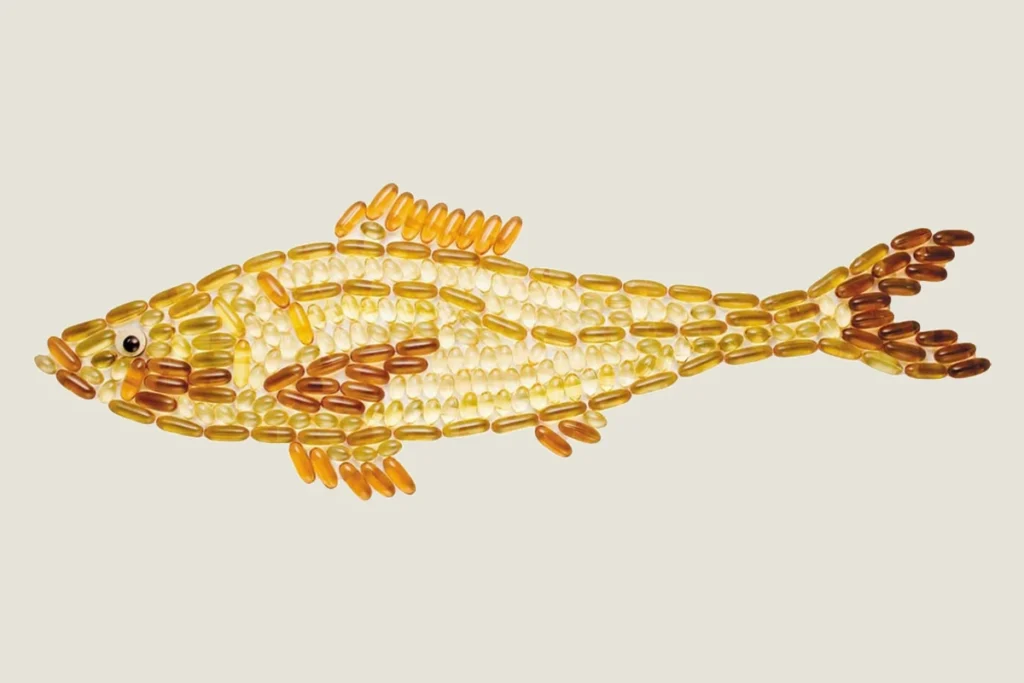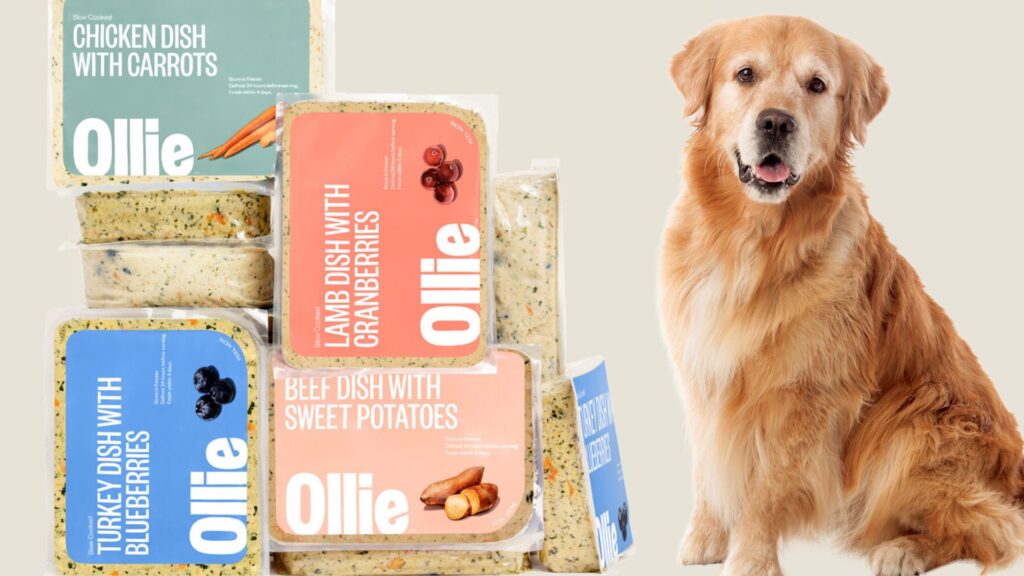Ollie is a premium dog food brand known for its commitment to quality and nutrition, offering customized meal plans tailored to the specific dietary needs and preferences of dogs.
The brand emphasizes the use of high-quality, human-grade ingredients in their recipes, ensuring that each meal is not only nutritious but also appetizing for pets.
By focusing on whole, natural ingredients and avoiding fillers and artificial additives, Ollie aims to promote the overall health and well-being of dogs, supporting everything from digestion and energy levels to skin and coat health.
Importance of Fish Oil in a Dog’s Diet
Fish oil is a valuable component of a dog’s diet, primarily because it is a rich source of omega-3 fatty acids, which are essential fats that dogs must obtain from their food.
These fatty acids, particularly eicosapentaenoic acid (EPA) and docosahexaenoic acid (DHA), are known for their anti-inflammatory properties and play a crucial role in maintaining the health and function of various bodily systems.

Understanding Fish Oil’s Benefits in Dog Nutrition
Omega-3 fatty acids found in fish oil are critical for dogs, as they contribute to the development and function of the brain and eyes.
These fatty acids are not synthesized naturally by dogs, making it essential to include them in their diet through food sources like fish oil.
How Fish Oil Supports Overall Dog Health
Skin and Coat Health
One of the most noticeable benefits of fish oil for dogs is its positive impact on skin and coat health. Omega-3 fatty acids help to nourish the skin, reducing dryness and itchiness, and promote a shiny, healthy coat.
This is particularly beneficial for dogs with skin conditions or allergies, as fish oil can help to soothe inflammation and improve skin barrier function.
Joint Mobility and Heart Health
Fish oil’s anti-inflammatory effects are also beneficial for dogs with joint issues, such as arthritis. By reducing inflammation around the joints, fish oil can help to improve mobility and reduce pain, making it easier for dogs to stay active and healthy.
Additionally, the omega-3 fatty acids in fish oil have been shown to support heart health, reducing the risk of heart disease and improving overall cardiovascular function.
Main Query: Does Ollie Dog Food Contain Fish Oil?

Yes, Ollie dog food does contain fish oil. According to a review on Veterinarians.org, Ollie recipes utilize natural, high-quality, human-grade ingredients, including fish oil, which is an excellent source of healthy fatty acids such as omega-3 (DHA & EPA) and omega-6.
This inclusion aligns with the nutritional benefits discussed earlier, emphasizing the importance of omega-3 fatty acids for a dog’s health, supporting skin and coat health, joint mobility, and heart health.
Understanding Fish Oil’s Benefits in Dog Nutrition
Fish oil is a significant dietary supplement for dogs, primarily due to its rich content of omega-3 fatty acids. These essential nutrients are crucial for a dog’s health but cannot be produced by the dog’s body, making it essential to include them in the diet.
Essential Fatty Acids in Fish Oil
The two primary omega-3 fatty acids found in fish oil are eicosapentaenoic acid (EPA) and docosahexaenoic acid (DHA).
EPA is known for its anti-inflammatory properties, which can help manage chronic conditions such as arthritis and allergies.
DHA is essential for brain and vision development in puppies and maintains cognitive function in adult dogs.
How Fish Oil Supports Overall Dog Health
- Skin and Coat Health: Omega-3 fatty acids from fish oil can improve skin health, leading to a shinier and healthier coat. They help reduce flakiness and itchiness, which can result from dry skin or allergies.
- Joint Mobility and Heart Health: By reducing inflammation, fish oil can enhance joint mobility in dogs with arthritis or other joint issues. Additionally, omega-3 fatty acids contribute to heart health by regulating blood pressure, reducing triglycerides, and decreasing the likelihood of heart disease.
Breaking Down Ollie’s Ingredients List
Ollie emphasizes transparency and quality in their ingredients, likely incorporating fish oil or omega-3 rich components into their recipes. Ingredients are chosen for their nutritional value, with a focus on supporting the health and well-being of dogs.
The Role of Fish Oil in Ollie’s Formulations
Fish oil could be included in Ollie dog food formulations for its omega-3 content, playing a vital role in supporting skin and coat health, joint mobility, and heart health.
Ollie may offer specific recipes that include fish oil, particularly those aimed at improving coat quality, supporting joint health, or catering to dogs with specific dietary needs.
These recipes would be designed to provide balanced nutrition while maximizing the health benefits of omega-3 fatty acids.
Alternative Sources of Omega-3 and Omega-6 in Ollie Dog Food

In addition to or instead of fish oil, Ollie might use alternative sources of omega-3 and omega-6 fatty acids, such as flaxseed, chia seeds, or hemp oil.
These ingredients can also support skin, coat, joint, and heart health, providing a broad spectrum of essential fatty acids necessary for a dog’s diet.
Fish oil and its benefits are crucial in dog nutrition, offering a range of health advantages from improved skin and coat condition to enhanced joint mobility and heart health.
High-quality dog food brands like Ollie recognize these benefits and are likely to include fish oil or alternative sources of essential fatty acids in their recipes to ensure a well-rounded, nutritious diet for pets.
Choosing the Right Ollie Recipe for Your Dog
Selecting the right Ollie recipe involves considering your dog’s age, breed, activity level, and any specific health concerns or dietary needs.
Ollie offers a range of recipes that cater to different nutritional requirements, ensuring a balanced diet that supports overall health.

For example, active dogs may benefit from higher protein and fat content, while older dogs might need recipes with joint-supporting nutrients like omega-3 fatty acids from fish oil.
- Age: Puppies, adults, and senior dogs have different nutritional needs. Choose a recipe that matches your dog’s life stage.
- Breed Size: Small breeds and large breeds have different calorie and nutrient requirements.
- Activity Level: More active dogs may need higher calorie recipes to fuel their energy needs.
- Health Issues: Dogs with specific health issues, such as allergies or joint problems, might benefit from recipes with particular ingredients like fish oil.
When to Consider Fish Oil Supplements
While Ollie recipes are formulated to meet the nutritional needs of most dogs, some pets may require additional supplementation for various reasons:
- Insufficient Omega-3 Intake: If a dog’s diet lacks sufficient omega-3 fatty acids, supplementation with fish oil can help achieve the recommended levels for optimal health.
- Health Conditions: Dogs with certain health conditions, such as skin allergies, arthritis, or heart problems, might benefit from the anti-inflammatory and heart-healthy effects of extra fish oil.
- Dietary Preferences: Some dogs might prefer certain flavors or types of food that don’t naturally contain high levels of omega-3 fatty acids, necessitating supplementation.
Comparing Ollie to Other Dog Foods
Fish Oil Content and Nutritional Comparison
When comparing Ollie to other dog food brands, consider the source and amount of omega-3 fatty acids, including fish oil content.
High-quality dog foods like Ollie typically use better sources of omega-3s, ensuring more effective absorption and health benefits.
Look for transparency in ingredient lists and nutritional information to understand how much fish oil or omega-3 fatty acids are in a dog food formula.
Why Ingredient Quality Matters
- Bioavailability: Higher quality ingredients are generally more bioavailable, meaning dogs can better absorb and utilize the nutrients they provide.
- Health Impact: Premium ingredients, including high-quality fish oil, contribute to better overall health, supporting everything from coat condition to cognitive function.
- Safety and Purity: High-quality dog foods are less likely to contain harmful contaminants and are often produced with stricter safety standards.
Considering fish oil supplements can further enhance your dog’s diet, especially for specific health conditions.
When comparing Ollie to other dog foods, the quality of ingredients, including the source and amount of omega-3 fatty acids, is crucial for ensuring your dog receives the best possible nutrition.
FAQs
Can I supplement my dog’s diet with additional fish oil?
Yes, you can supplement your dog’s diet with additional fish oil to ensure they receive adequate levels of omega-3 fatty acids, which are crucial for their health.
Fish oil supplements can support skin and coat health, improve joint mobility, and contribute to heart health.
However, it’s important to consult with a veterinarian to determine the appropriate dosage, as too much can lead to negative side effects.
Are there any risks associated with fish oil in dog food?
While fish oil is beneficial, there are potential risks if administered improperly:
- Excessive Dosage: Over-supplementation can lead to vitamin D toxicity, bleeding disorders, or an imbalance in omega-6 to omega-3 ratios, which can affect immune function.
- Quality Concerns: Low-quality fish oil may contain harmful contaminants such as mercury or PCBs. Always choose high-quality, purified fish oil supplements.
- Interactions with Medications: Fish oil can interact with certain medications, including blood thinners and anti-inflammatory drugs, so it’s essential to consult with a vet before starting supplementation.
How do I choose the best Ollie recipe for my dog’s health needs?
Choosing the best Ollie recipe involves considering several factors:
- Life Stage: Select a recipe appropriate for your dog’s age (puppy, adult, senior) to ensure it meets their nutritional needs.
- Health Conditions: For dogs with specific health issues like allergies or joint problems, look for recipes that address these concerns with targeted ingredients.
- Activity Level: Active dogs may require recipes with higher protein and fat content, while less active pets might benefit from lower-calorie options.
- Personal Preferences: Consider your dog’s taste preferences and any dietary restrictions they may have.
Summary
Fish oil plays a vital role in a dog’s diet, offering numerous health benefits from improving skin and coat quality to enhancing joint mobility and supporting heart health. Ollie dog food recognizes the importance of incorporating essential nutrients, including omega-3 fatty acids, into their recipes to promote overall well-being and longevity in pets.
When choosing Ollie dog food, consider your dog’s specific health needs, preferences, and life stage to select a formula that best supports their health and happiness.
Consulting with a veterinarian can provide personalized advice and ensure that any dietary supplements, including fish oil, are used safely and effectively, enhancing the nutritional benefits of Ollie’s high-quality, balanced meals.


